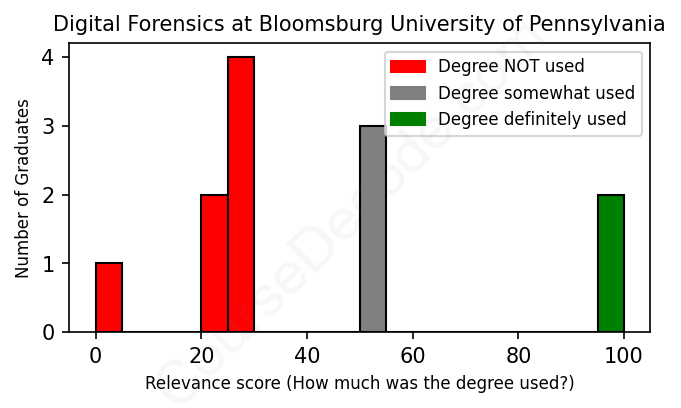
First, some facts. Of the Digital Forensics graduates from Bloomsburg University of Pennsylvania we've analyzed , here's how many have used (or NOT used) their degree in their career:

These are estimates based on AI analysis of 12 LinkedIn profiles (see below).
The verdict? Bad. Overall, with an average relevance score of 41%, Digital Forensics graduates from Bloomsburg University of Pennsylvania have a substantially lower likelihood (-26%) of finding work in this field compared to the average graduate across all fields:
And for comparison, here's the chart for all profiles we've looked at across all degrees.
Also, after graduating, only 8% of these graduates have pursued further education other than another Bachelor's degree (such as a Masters degree or other), compared to the average across all profiles of 35%. This suggests a Bachelors degree is enough for most Digital Forensics graduates, and it's normal to look for work straight after graduation.
See the details:
|
Relevance score: 50% We think this person has gone into a career only somewhat relevant to their degree. We think this person has gone into a career only somewhat relevant to their degree.
DEGREE INFOGraduated in 2015 from Bloomsburg University of Pennsylvania with a Bachelors Degree in Digital Forensics. No other secondary education since. JOB HISTORY SINCE GRADUATIONEpic System Analyst Geisinger Medical Center Mar 2017 - Present ABOUTI graduated from Bloomsburg University of Pennsylvania in May of 2015 with a Bachelor's degree in Digital Forensics and a minor in Criminal Justice. |
The top 10 most common jobs done by the graduates we've analyzed (ranked most common to least) are:
From analyzing the LinkedIn profiles of graduates from Bloomsburg University of Pennsylvania with a degree in Digital Forensics, it seems like many have ventured into jobs that don’t directly relate to their major. While there are a few who found roles like Digital Forensic Technician or Digital Analyst, most took on positions in areas like retail management, casework, or various customer service roles. Jobs such as Grocery Sales Associate, Loan Processing Specialist, and even positions within medical or automotive sales represent significant deviations from the technical skill set a Digital Forensics degree provides. It's not surprising either, as many graduates seem to have taken their skills in directions that might not require the heavy analytical and technical focus that forensic studies involve.
It’s clear that while a few have secured positions that directly apply their digital forensics knowledge, a large portion of graduates have ended up in jobs that don’t leverage their degree’s core skills. Many roles focus on customer interaction, basic IT support, or general management tasks, which might not tap into the forensic analysis and investigative skills they developed during their studies. This trend suggests a potential mismatch between the educational path and the job market, or simply that graduates are exploring diverse opportunities that might not strictly align with digital forensics but still allow for skill application in a broader sense.
Here is a visual representation of the most common words in job titles for Digital Forensics graduates (this is across all Digital Forensics graduates we've analyzed, not just those who went to Bloomsburg University of Pennsylvania):

Looking at the career paths of graduates from the Digital Forensics program at Bloomsburg University of Pennsylvania, it seems like there's a mix of success and not-so-successful outcomes. Many of the earlier grads, particularly those who graduated around 2015, started their careers in roles that weren’t directly related to digital forensics, like grocery sales and banking. This can happen, especially in a competitive job market, where some people might not land a job in their field right after graduation and end up taking what they can get to gain some work experience.
However, as we move through the years, some graduates began to snag positions that align more closely with digital forensics, such as Digital Forensic Technicians and Information Security Specialists. By five years post-graduation, some grads have managed to find roles that reflect their degree better and even climb up the ranks. A few are even taking on leadership positions in digital analysis. So, while it's clear that not every graduate immediately found success in their desired field, many seem to have eventually carved out a niche for themselves. As for 10 years down the road, it's tough to say for certain, but if the trend continues, I’d bet that more and more of these graduates will likely be in solid careers tied to digital forensics or related fields.
Getting a Bachelor’s degree in Digital Forensics can be pretty challenging, but like most programs, it really depends on your background and interest in the subject. At Bloomsburg University, you'll dive into courses that cover everything from cybercrime investigation to data recovery, which can feel overwhelming at times, especially if you're not already tech-savvy. However, if you have a passion for technology and problem-solving, you might find it engaging rather than tough. It’s not necessarily harder than other degrees, but expect a good amount of hands-on learning and some intense projects. Just be ready to put in the effort—it can be tricky, but totally doable!
Most commonly, in the LinkedIn profiles we've looked at, it takes people 4 years to finish a Bachelor degree in Digital Forensics.
Looking at the careers of these Digital Forensics grads from Bloomsburg University, it seems like they’ve had a pretty mixed bag when it comes to money. Some, like the Epic System Analyst and the Information Security Specialist, probably earn decent salaries given the demand for tech roles in healthcare and security. However, there are also folks who started off in lower-paying jobs, like the grocery sales associate, and have slowly climbed the ladder, suggesting they might not be raking in the big bucks just yet. And then there’s the one person who's been unemployed since 2016—definitely not a great sign of financial stability. Overall, it appears some have found well-paying jobs in their field, while others are still working their way up or have hit some bumps along the way.
Here is a visual representation of the most common words seen in the "about" section of LinkedIn profiles who have a Bachelor degree in Digital Forensics (this is across all Digital Forensics graduates we've analyzed, not just those who went to Bloomsburg University of Pennsylvania). This may or may not be useful:

Here are all colleges offering a Bachelor degree in Digital Forensics (ordered by the average relevance score of their Digital Forensics graduates, best to worst) where we have analyzed at least 10 of their graduates:
| College | Score | Count |
|---|---|---|
 Bloomsburg University of Pennsylvania Bloomsburg University of Pennsylvania
|
41 | 12 |